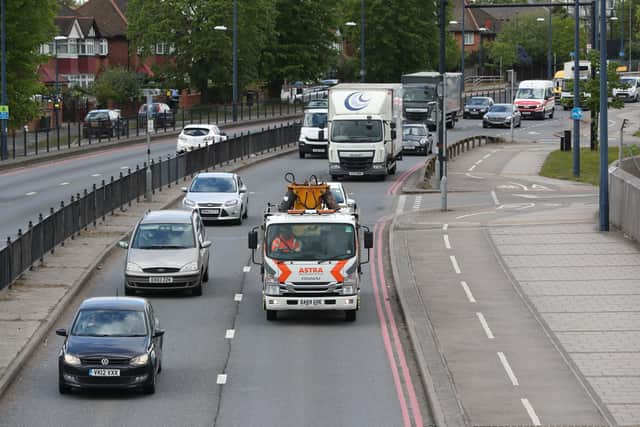Doncaster transport emissions fell by record amount in 2020
and live on Freeview channel 276
Friends of the Earth said though a national drop in transport emissions is not surprising due to successive lockdowns during the first year of the coronavirus pandemic, the Government should do more to encourage people to switch to electric vehicles or ditch their cars entirely as emissions rebound.
Department for Business, Energy and Industrial Strategy figures show transport – including cars, trains and other modes of travel – caused 796 kilo-tonnes of carbon dioxide equivalent (ktCO2e) emissions in Doncaster in 2020.
Advertisement
Hide AdAdvertisement
Hide AdThis was down from 933 the year before and the largest decrease since 2005, when records began – that year, transport emissions hit 946 ktCO2e.


Carbon dioxide equivalent determines the amount of CO2 that would need to be emitted to equal the same global warming potential of other produced greenhouse gases.
Road vehicles accounted for 95 per cent of transport emissions, while diesel-powered trains produced a further three per cent.
Across the UK, the carbon footprint caused by transport dropped by a record 23,350 ktCO2e (18%), from 130,021 to 106,671.
Advertisement
Hide AdAdvertisement
Hide AdFriends of the Earth attributed the dramatic fall to the general public travelling less during lockdown.
Mike Childs, head of policy, said rebounding traffic levels are now contributing to the Government's struggle in meeting its climate targets.
The Government pledged to cut emissions by 78 per cent by 2035 compared to 1990 levels and reach net zero by 2050.
A Government spokesperson said: "We have committed unprecedented funding to encourage walking and cycling, as well as to accelerate the roll-out of electric vehicles – both vital steps to reaching our world-leading net zero targets.
Advertisement
Hide AdAdvertisement
Hide Ad"This includes the £2.5 billion rollout of zero-emission vehicles and charging infrastructure across the country, ensuring the switch is as simple as possible for motorists."
Doncaster's total greenhouse gas emissions fell to 1,949 ktC02e in 2020, down 10 per cent from 1,949 the year before.
Of this, 41 per cent was caused by transport, while commercial emissions accounted for eight per cent%, industry produced 13% and domestic use 22 per cent.
The average person in Doncaster produced six tCO2e in 2020.
In these confusing and worrying times, local journalism is more vital than ever. Thanks to everyone who helps us ask the questions that matter by taking out a subscription or buying a paper. We stand together. Dominic Brown, editor.
Comment Guidelines
National World encourages reader discussion on our stories. User feedback, insights and back-and-forth exchanges add a rich layer of context to reporting. Please review our Community Guidelines before commenting.
